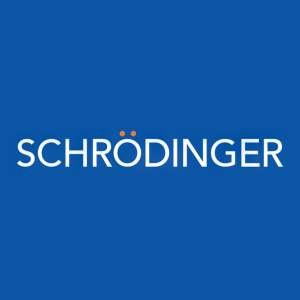Schrödinger Reports New Preclinical Data Supporting Advancement of Its Wee1 Inhibitor Program at American Association of Cancer Research 2022 Annual Meeting
Schrödinger, Inc. (Nasdaq: SDGR) presented promising preclinical data on its Wee1 inhibitors at the AACR Annual Meeting. These inhibitors demonstrate strong anti-tumor activity and potential for monotherapy and combination therapy. The company plans to identify a Wee1 development candidate by 2022 and submit an IND application to the FDA in 2023. The study highlighted a compound, STC-8123, showing high selectivity and sustained anti-tumor effects without significant side effects, indicating a favorable dosing regimen.
- Strong anti-tumor activity of Wee1 inhibitors in preclinical models.
- Plans to select a development candidate and submit an IND application in 2023.
- STC-8123 demonstrated sustained pharmacodynamic properties and tolerability.
- None.
Insights
Analyzing...
Schrödinger’s Highly Selective and Structurally-Distinct Wee1 Inhibitors Demonstrate Strong Anti-Tumor Activity in Tumor Models
On Track to Select a Wee1 Development Candidate in 2022
“The strength of our data underscore the potential of our novel, orally available and potent Wee1 inhibitors and provide an opportunity to advance a potential best-in-class Wee1 inhibitor into the clinic,” said
Wee1 is a gatekeeper checkpoint kinase that prevents cellular progression through the cell cycle, allowing time for DNA repair before cell division takes place. Inhibition of Wee1 allows for accumulation of DNA damage, triggering DNA breakage and apoptosis in tumor cells. Wee1 is emerging as a potentially important therapeutic target for a range of solid tumors, including ovarian and uterine cancer.
Schrödinger is on track to select a Wee1 development candidate later this year. Subject to completion of the preclinical data packages, Schrödinger anticipates submitting an Investigation New Drug (IND) Application to the
Additional Details About the Study
The presentation, “Discovery of potent, selective, and orally available Wee1 inhibitors that demonstrate increased DNA damage and mitosis in tumor cells leading to tumor regression in vivo,” highlighted preclinical data with multiple lead compounds discovered using Schrödinger’s proprietary physics-based free energy perturbation (FEP+) modeling technology. These molecules demonstrate superior kinase selectivity compared to other known Wee1 inhibitors in a broad kinase panel. In multiple preclinical models, a representative compound, STC-8123, was well tolerated and demonstrated sustained pharmacodynamic and pharmacokinetic properties. The anti-tumor effects of STC-8123 were maintained during dosing holidays while allowing full recovery of mechanism-based hematological effects, likely due to its sustained plasma concentrations and high exposure in tumors. Schrödinger’s advanced Wee1 program compounds maintained potency, selectivity and anti-tumor activity with no detectable time-dependent inhibition of CYP3A4, a key liver enzyme. Taken together, these data support a profile that may enable a favorable dosing regimen and further evaluation of a potential best-in-class Wee1 inhibitor as both monotherapy and as part of combination therapy with other agents.
About Schrödinger
Schrödinger is transforming the way therapeutics and materials are discovered. Schrödinger has pioneered a physics-based software platform that enables discovery of high-quality, novel molecules for drug development and materials applications more rapidly and at lower cost compared to traditional methods. The software platform is used by biopharmaceutical and industrial companies, academic institutions, and government laboratories around the world. Schrödinger’s multidisciplinary drug discovery team also leverages the software platform to advance collaborative programs and its own pipeline of novel therapeutics to address unmet medical needs.
Founded in 1990, Schrödinger has over 650 employees and is engaged with customers and collaborators in more than 70 countries. To learn more, visit www.schrodinger.com follow us on LinkedIn and Twitter, or visit our blog, Extrapolations.com.
Cautionary Note Regarding Forward-Looking Statements
This press release contains forward-looking statements within the meaning of The Private Securities Litigation Reform Act of 1995 including, but not limited to, those statements regarding the clinical potential of Wee1 inhibitors, the properties of the Wee1 inhibitors that we have identified, the potential for our Wee1 inhibitors to be used as monotherapy or as a combination therapy with other agents, and our expected timing for selecting a development candidate and submitting an IND to the FDA for our Wee1 program. Statements including words such as “anticipate,” “believe,” “contemplate,” “continue,” “could,” “estimate,” “expect,” “intend,” “may,” “might,” “plan,” “potential,” “predict,” “project,” “should,” “target,” “will,” “would” and statements in the future tense are forward-looking statements. These forward-looking statements reflect our current views about our plans, intentions, expectations, strategies and prospects, which are based on the information currently available to us and on assumptions we have made. Actual results may differ materially from those described in these forward-looking statements and are subject to a variety of assumptions, uncertainties, risks and important factors that are beyond our control, including the uncertainties inherent in drug development and commercialization, such as the conduct of research activities and the timing of and our ability to initiate and complete preclinical studies and clinical trials, whether results from preclinical studies will be predictive of the results of later preclinical studies and clinical trials, uncertainties associated with the regulatory review of IND submissions, clinical trials and applications for marketing approvals, the ability to retain and hire key personnel and the direct and indirect impacts of the ongoing COVID-19 pandemic on our business and other risks detailed under the caption “Risk Factors” and elsewhere in our
View source version on businesswire.com: https://www.businesswire.com/news/home/20220412005089/en/
Investors:
Schrödinger, Inc.
jaren.madden@schrodinger.com
617-286-6264
Media:
Schrödinger, Inc.
tracy.lessor@schrodinger.com
617-519-9827
Source: Schrödinger, Inc.







